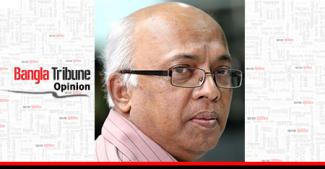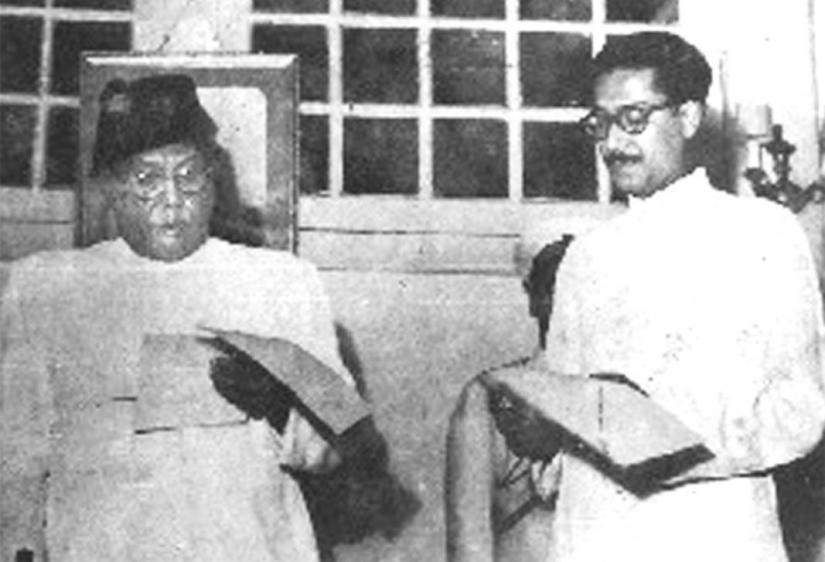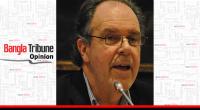 Abul Kashem Fazlul Huq was an embodiment of electric energy. He was larger than life, in the literal as well as figurative sense of the word. In all the years he spent in politics --- and that was nearly his entire life --- he demonstrated a restlessness which only comes to men for whom politics is that higher calling in life in which lie embedded the seeds of human welfare. Sher-e-Bangla, for that is how we remember him, belonged to a generation of men and women who fully, truly and endlessly believed in the capacity of politics to change the fate of men. When you study his times, when you observe the trajectory of his beliefs and his achievements, you do not miss that one cardinal point which defined his career: he was a man of the people.
Abul Kashem Fazlul Huq was an embodiment of electric energy. He was larger than life, in the literal as well as figurative sense of the word. In all the years he spent in politics --- and that was nearly his entire life --- he demonstrated a restlessness which only comes to men for whom politics is that higher calling in life in which lie embedded the seeds of human welfare. Sher-e-Bangla, for that is how we remember him, belonged to a generation of men and women who fully, truly and endlessly believed in the capacity of politics to change the fate of men. When you study his times, when you observe the trajectory of his beliefs and his achievements, you do not miss that one cardinal point which defined his career: he was a man of the people.
And that was not quite something you could say about Huseyn Shaheed Suhrawardy. For all his attachment to politics and his putative contributions to the democratic struggle in Pakistan or even before that, Suhrawardy remained essentially an outsider when it came to dealing with people in the essential rawness that such interaction entails. Huq was different. As a leading figure in the movement for Pakistan, again as a central element in the politics of Bengal, he understood the pulse of the people, in this instance the simple folks who dotted the land. There was in him that certain pull of the local as well, that particular Barisal touch, which did not ever become the casualty of his incessant rise in politics. Sher-e-Bangla did not or could not turn into an all-India figure. He was circumscribed by or was content to be in provincial Bengal. He was forever bursting with passion, was always garrulous in conversation, was unceasingly driven by the larger issues confronting life.
Huq’s attachment to the grassroots notwithstanding, there was the love of pomp and power in the man. The very idea that he had to step down as Bengal’s prime minister, once his Muslim League support base vanished, was anathema to him. He quickly went for a deal with Shyama Prasad Mukherjee and hung on to authority. There was a secular spirit in him and yet it was he who cheerfully tabled the so-called Pakistan Resolution in March 1940 in Lahore. It is said that the Muslim League councillors went wild with excitement as he entered the venue of that decisive conference. He relished it all, swaying slowly from left to right and vice versa, savouring his moment in the sun. It did not matter that his appearance interrupted Mohammad Ali Jinnah, then on the dais explaining the need for Muslim freedom. Jinnah, used to undivided adulation, was clearly peeved at the cheers for Huq. ‘Now that the tiger of Bengal is here, I must stop speaking’, said he. The future, if you recall, did not have space for these men together. Jinnah would push Huq out of the Muslim League; and Huq would lash out at Jinnah in all the fury of language he could muster. Fazlul Huq possessed that rare capacity for greatness. Yet greatness quite eluded him, for reasons that only he was to be held responsible for. He played a pivotal role in the United Front electoral victory over the Muslim League in East Bengal in 1954. As chief minister, he was expected to inaugurate a transformation in Bengali and by extension Pakistani politics. He was not permitted to do that by a West Pakistan-based coterie intent on frustrating Bengali aspirations. Pilloried for his sentimental remarks on the historical oneness of the two Bengals on a nostalgic visit to Calcutta soon after the elections, Huq was soon brought down along with his ministry. The imposition of Section 92-a unnerved him, to a point where, unlike the vocal Moulana Abdul Hamid Khan Bhashani and a young and rising Sheikh Mujibur Rahman, he felt little need to mount a struggle for a restoration of the United Front government.
Fazlul Huq possessed that rare capacity for greatness. Yet greatness quite eluded him, for reasons that only he was to be held responsible for. He played a pivotal role in the United Front electoral victory over the Muslim League in East Bengal in 1954. As chief minister, he was expected to inaugurate a transformation in Bengali and by extension Pakistani politics. He was not permitted to do that by a West Pakistan-based coterie intent on frustrating Bengali aspirations. Pilloried for his sentimental remarks on the historical oneness of the two Bengals on a nostalgic visit to Calcutta soon after the elections, Huq was soon brought down along with his ministry. The imposition of Section 92-a unnerved him, to a point where, unlike the vocal Moulana Abdul Hamid Khan Bhashani and a young and rising Sheikh Mujibur Rahman, he felt little need to mount a struggle for a restoration of the United Front government.
And then occurred the unbelievable: Huq allied himself with the very central government that had called him a traitor to Pakistan and assumed office as Pakistan’s interior minister in 1955. For his fellow Bengalis, he was as good as lost to their cause. His relevance in Pakistani politics and in the Bengali political consciousness reached a twilight when he took over as governor of East Pakistan in 1956 and at one point felt he was doing no wrong by turfing the provincial ministry of Ataur Rahman Khan out of office. The final sealing of Sher-e-Bangla’s politics had as much to do with infirmity of age as with the imposition of martial law in October 1958. In his final days he was a lonely man, a has-been in politics. Age had taken its toll on him.
Despite everything, though, Sher-e-Bangla remains a giant in Bengali political memory. His flip-flops quite took the shine out of him, but that his was a tall presence nevertheless in the politics of the 1930s and 1940s is an unvarnished truth. He touched lives, spoke for the underprivileged and gave short shrift to the elite --- a quality that would be fine tuned and refined by a future Bangabandhu Sheikh Mujibur Rahman. Where Suhrawardy was a shrewd actor, Huq was a natural in his defence of the public interest. Where Bhashani demonstrated a refreshing degree of rusticity in politics, Huq gave politics a dash of the pastoral.
At the end of the day, Abul Kashem Fazlul Haq was one of us. Because he was, he remains our Sher-e-Bengal.
(Sher-e-Bangla A.K. Fazlul Huq was born on 26 October 1873 and passed away on 27 April 1962)
Syed Badrul Ahsan is the Editor-in-Charge at The Asian Age.
 Opinion
Opinion
30867 hour(s) 28 minute(s) ago ;
Evening 10:22 ; Wednesday ; Apr 24, 2024
A.K. Fazlul Huq was one of us
Send
Syed Badrul Ahsan
Published : 16:19, Oct 30, 2018 | Updated : 19:09, Feb 06, 2019
Published : 16:19, Oct 30, 2018 | Updated : 19:09, Feb 06, 2019
0 ...0 ...
/hb/
Topics: Syed Badrul Ahsan
***The opinions, beliefs and viewpoints expressed in this article are those of the author and do not reflect the opinions and views of Bangla Tribune.
- KOICA donates medical supplies to BSMMU
- 5 more flights to take back British nationals to London
- Covid19: Rajarbagh, Mohammadpur worst affected
- Momen joins UN solidarity song over COVID-19 combat
- Covid-19: OIC to hold special meeting
- WFP begins food distribution in Cox’s Bazar
- WFP begins food distribution in Cox’s Bazar
- 290 return home to Australia
- Third charter flight for US citizens to return home
- Dhaka proposes to postpone D8 Summit
Unauthorized use of news, image, information, etc published by Bangla Tribune is punishable by copyright law. Appropriate legal steps will be taken by the management against any person or body that infringes those laws.
Bangla Tribune is one of the most revered online newspapers in Bangladesh, due to its reputation of neutral coverage and incisive analysis.
F R Tower, 8/C Panthapath, Shukrabad, Dhaka-1207 | Phone: 58151324; 58151326, Fax: 58151329 | Mob: 01730794527, 01730794528


